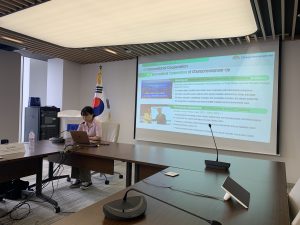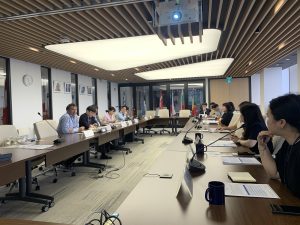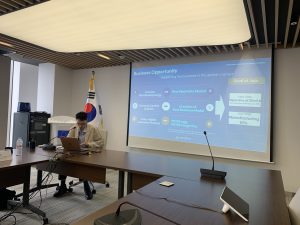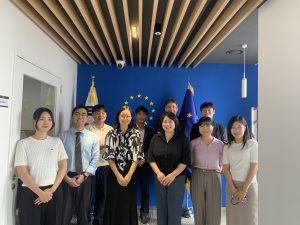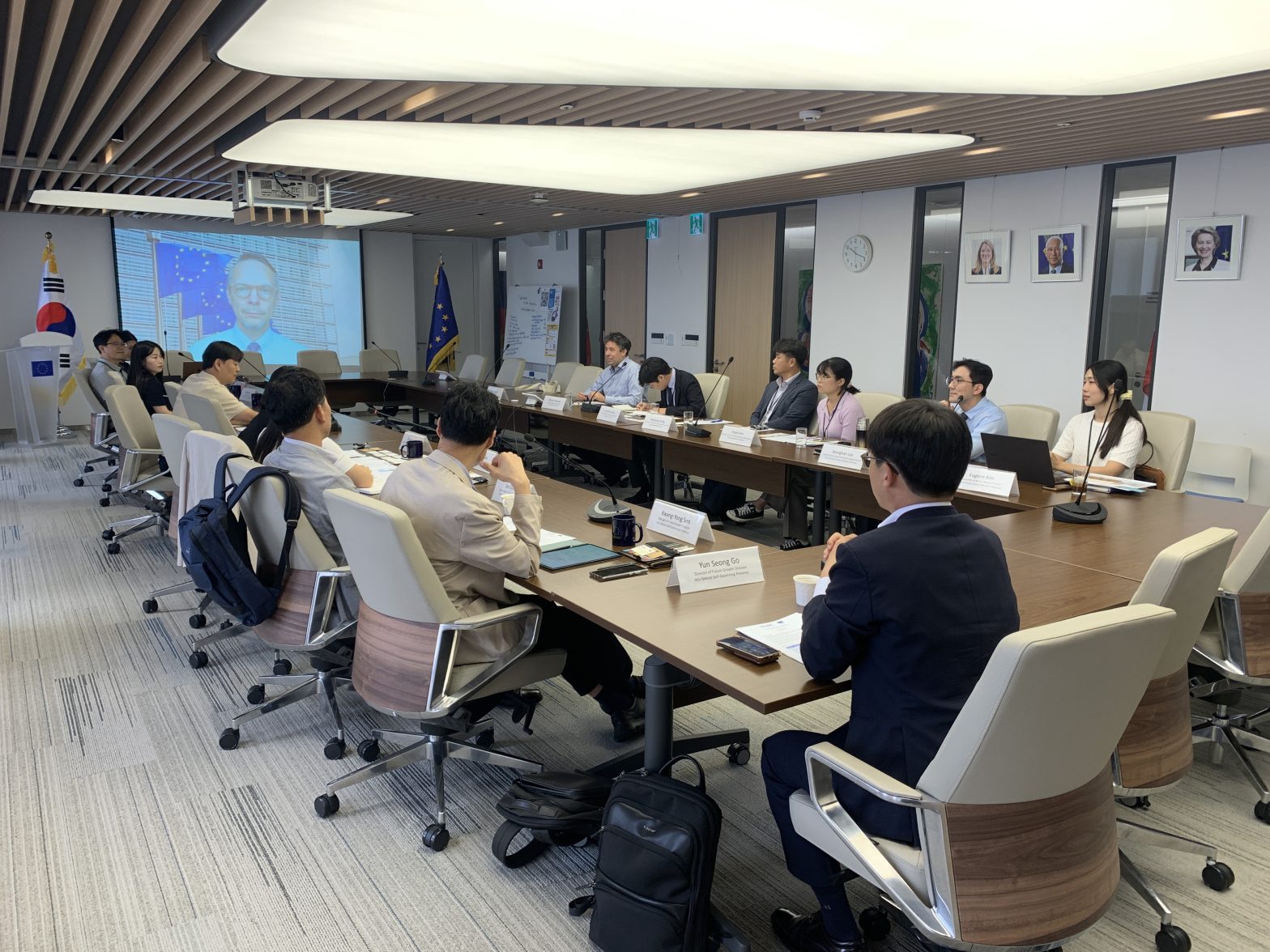The IURC programme launched its first exciting kick-off meeting in Korea with delegations from Seoul Metropolitan Government, City of Jeonju, Incheon Metropolitan City, Jeollanam-do Provincial Government, Chungcheongnam-do Province, Jeju Special Self-Governing Province.
All 6 Korean cities and regions shared their commitment and ambitions towards expanding partnership with EU partners in sustainable urban development and regional innovation field.
At the IURC Korea kick-off, Mr. Lutz Köppen from Directorate-General for Regional and Urban Policy (DG REGIO) highlighted the longstanding EU–Korea partnership and shared goals of sustainable development and innovation. He emphasised the key role of local authorities and encouraged participants to build momentum by sharing experiences, forming new partnerships, and aligning with broader EU initiatives like the EU–Korea Green Partnership.
The session began with remarks from Mr. Patrick Polacsek and Mr. Jong-Han Rhee of the EU Delegation to Korea. Mr. Polacsek underscored the significance of the newly signed EU–Korea Green and Digital Partnerships as key frameworks for deepening collaboration. He highlighted the critical role of cities in addressing the climate crisis through practical solutions and expressed his support for the ongoing IURC programme.
Mr. Rhee introduced the Korea Green Partnership Programme, launched in January 2024, which focuses on climate, environment, and energy. He expressed optimism about future collaboration between the IURC and the Korea Green Partnership, anticipating strong synergies.
Ms. Chaeyeon Lee from Seoul Metropolitan Government’s Transportation Policy Division introduced Seoul’s Smart Mobility Strategy, aimed at creating a sustainable urban future. As an advocate for urban mobility innovation, Seoul seeks to co-develop new solutions with European partners through the IURC programme.
Ms. Lee highlighted five ongoing best practices in urban mobility innovation:
-
Driverless Bus – addressing mobility gaps
-
Tagless Gate – improving accessibility for the disabled, elderly, and strollers
-
Urban Air Mobility (UAM) – developing a UAM network near Gimpo Airport
-
Climate Card – promoting eco-friendly transport, inspired by a German system
-
TOPIS – integrating transportation and disaster management
She concluded by expressing Seoul’s openness to further collaboration beyond the presented policies, welcoming partnerships aligned with EU cities’ interests.
Dr. Seunghan Lee from the Jeonju Research Institute introduced Jeonju’s rich cultural identity, including its renowned food, film festival, and heritage sites such as Hanok Village. As the hub city of Jeonbuk province, Jeonju holds a strategic location. Dr. Lee noted that Jeonju faces high greenhouse gas emissions in the building and transportation sectors, compounded by challenges like urban aging, population decline, limited financial independence, and lack of major industries.
For the way forward, Jeonju aims to advance digital innovation and energy transition, particularly in the historic Hanok Village, balancing preservation with modernisation. The city expressed strong interest in collaborating with other cities that share cultural heritage preservation goals.
Mr. Sangho Lee, representing Incheon City and the Incheon Free Economic Zone (IFEZ), presented Incheon’s goals for international cooperation. Through the IURC programme, IFEZ aims to build sustainable, citizen-centered smart cities in collaboration with EU partners. He highlighted IFEZ’s shift from a technology-driven approach to one centered on inclusive urban innovation, leveraging AI and digital twin technologies. Past collaborations with cities such as Berlin, Milan, and Rotterdam were noted, along with the importance of academia, startups, and civil society in driving agile governance. Mr. Lee emphasized IFEZ’s commitment to co-developing impactful pilot projects and long-term partnerships through the IURC programme.
Ms. Sehee Park from the Energy Policy Division of Jeollanam-do Province presented the region’s ambitious plans for energy transition. She highlighted Jeollanam-do’s leadership in solar, offshore wind, hydrogen, and bioenergy, and its commitment to building a sustainable energy ecosystem. Key initiatives included the Energy Valley cluster and a technology partnership with Germany’s Fraunhofer ISIT. Ms. Park emphasized the need to ensure local community benefits from the energy transition and expressed interest in cooperating with EU regions through policy exchange, joint pilot projects, and global market collaboration to address shared energy and climate challenges.
Ms. Hyejin Kim from Chungcheongnam-do Province shared the region’s ambitious goal to achieve carbon neutrality by 2045, five years ahead of Korea’s national target. She introduced key initiatives such as a circular plastic economy, the Climate Crisis Safe Village project, and the development of renewable energy on idle public land. The province plays an active role in international climate cooperation, notably through its participation in the Under2 Coalition and by hosting the annual Carbon Neutrality Conference. Emphasizing the importance of collaboration, Ms. Kim invited global partners to engage with Chungcheongnam-do through the IURC programme, and concluded by welcoming all participants to the upcoming 9th Chungcheongnam-do International Carbon Neutrality Conference.
Mr. Kwang-Yong Seo from Jeju Special Self-Governing Province shared Jeju’s bold goal of achieving carbon neutrality by 2035, driven by renewable energy and green hydrogen. He highlighted Jeju’s leadership in clean energy, with the highest renewable energy generation rate in Korea and plans for large-scale offshore wind and hydrogen projects. Mr. Seo showcased key initiatives such as the Carbon Free Island, RE100 achievement, and strong public-private partnerships aimed at positioning Jeju as a global green hydrogen hub. He called for international cooperation to address grid limitations and to establish Jeju as a model for cross-border sustainable energy transition and climate action.
